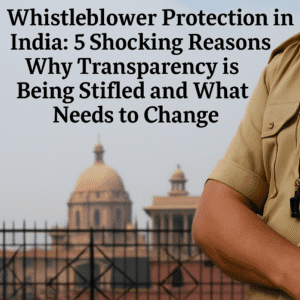Whistleblower Protection in India: 5 Shocking Reasons Why Transparency is Being Stifled and What Needs to Change
India’s journey toward transparency has been shaped by both inspiring courage and devastating loss, with whistleblowers like Satyendra Dubey and Shanmugam Manjunath paying with their lives for exposing corruption. The Whistle Blowers Protection Act (WBPA) of 2014, though designed to shield such individuals, remains unimplemented, leaving critical gaps in anonymity, oversight, and protection. Unlike global best practices in New Zealand and the UK, India’s framework lacks confidentiality guarantees and independent investigative mechanisms, exposing whistleblowers to danger and retaliation. The Act’s limited scope and absence of financial or legal safeguards further discourage reporting.
Compounding this, the colonial-era Official Secrets Act undermines the Right to Information by criminalizing disclosures in the public interest. Legislative inertia continues despite judicial interventions favoring transparency, such as in the Rafale case. India must urgently reform the WBPA, repeal the OSA, and strengthen RTI enforcement to protect those who dare to speak out. Civil society and lawmakers must work together to ensure whistleblower protection is not a privilege, but a democratic necessity.

Whistleblower Protection in India: 5 Shocking Reasons Why Transparency is Being Stifled and What Needs to Change
India’s journey toward transparency has been marked by both courage and tragedy. From Satyendra Dubey, murdered in 2003 for exposing highway corruption, to Indian Oil engineer Shanmugam Manjunath, killed in 2005 for fighting fuel adulteration, whistleblowers have paid a steep price for truth. The Whistle Blowers Protection Act (WBPA) of 2014 was meant to shield such individuals, yet a decade later, it remains unimplemented. This stagnation reflects deeper tensions between accountability and bureaucratic secrecy—a struggle emblematic of India’s democratic evolution.
The WBPA 2014: Promise and Pitfalls
The WBPA emerged from decades of advocacy, including recommendations by the Law Commission (2001) and the UN Convention Against Corruption (2005). Designed to protect those exposing corruption or misuse of power, the Act allows complaints to “competent authorities” (e.g., vigilance commissions) while bypassing the draconian Official Secrets Act (OSA) of 1923. However, critical flaws undermine its potential:
- Anonymity Denied: Unlike New Zealand’s Protected Disclosures Act (2000), which mandates confidentiality unless public safety demands disclosure, the WBPA requires whistleblowers to reveal their identities. This contravenes privacy rights under K.S. Puttaswamy v. Union of India (2017), where the Supreme Court recognized privacy as intrinsic to dignity and life (Article 21). Forcing identification endangers whistleblowers, as seen in the murders of Dubey and Manjunath.
- Structural Bias: The Act tasks “competent authorities” within the same organizations accused of wrongdoing to investigate complaints. This creates conflicts of interest, unlike the UK’s multi-tiered approach under its Public Interest Disclosure Act (1998), which permits disclosures to regulators, employers, or even the media.
- Limited Scope: The WBPA excludes the Special Protection Group and lacks provisions for financial rewards or immunity from civil/ criminal liability, reducing incentives for individuals to come forward.
Global Lessons: What India Can Learn
- United Kingdom: The UK’s framework emphasizes proportionality. While internal disclosures are preferred, whistleblowers can approach regulators or the media if risks persist. Coupled with anti-retaliation protections under the Bribery Act (2010), this balances institutional trust with public interest.
- New Zealand: By mandating confidentiality (Section 19, Protected Disclosures Act), New Zealand shields whistleblowers unless disclosure is essential for justice or public safety. India’s WBPA could adopt similar safeguards to prevent reprisals.
Clash of Laws: RTI vs. Official Secrets Act
The Right to Information (RTI) Act (2005) revolutionized transparency, enabling citizens to access government records. However, its promise is diluted by the OSA, a colonial-era law weaponized to suppress dissent. Recent cases highlight this conflict:
- Journalist Tarakant Dwivedi was charged under the OSA in 2011 for reporting on corroded police weapons.
- In 2019, the government attempted to invoke the OSA against The Hindu for publishing leaked Rafale deal documents, but the Supreme Court upheld journalists’ rights to use such materials in public interest.
The OSA’s vague definitions (e.g., “official secrets”) enable abuse, stifling accountability. The Second Administrative Reforms Commission (2006) recommended repealing the OSA, yet it persists, reflecting systemic resistance to transparency.
Pathways to Reform
- Amend the WBPA:
- Anonymity: Mirror New Zealand’s model by safeguarding identities unless disclosure is unavoidable.
- Independent Oversight: Replace internal “competent authorities” with autonomous bodies, akin to Lokpal, to ensure impartiality.
- Financial Incentives: Introduce rewards for whistleblowers, as seen in the U.S. False Claims Act, to offset personal risks.
- Repeal the OSA: Replace it with a modern framework aligning national security with transparency. Classified information should be narrowly defined, subject to judicial review, and time-bound.
- Strengthen RTI: Address bureaucratic roadblocks and political interference undermining RTI implementation. Over 55 RTI activists have been killed since 2005—a stark reminder of the risks transparency advocates face.
Conclusion: Democracy’s Guardians Need Guarding
Whistleblowers are democracy’s sentinels, yet India’s legal framework leaves them vulnerable. The WBPA’s stagnation and the OSA’s overreach reveal a state ambivalent about accountability. As the Rafale case showed, courts increasingly prioritize public interest over opaque governance. Legislative reforms must follow this judicial courage.
Implementing a revised WBPA, dismantling colonial secrecy laws, and empowering RTI institutions are not mere policy choices—they are urgent steps to honor citizens like Dubey and Manjunath, whose sacrifices underscore the cost of silence. In the words of Justice Mathew (State of U.P. v. Raj Narain), “In a democracy, the people have a right to know.” Protecting those who dare to speak ensures that right endures.
You must be logged in to post a comment.